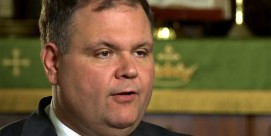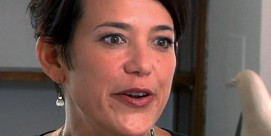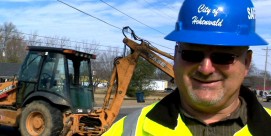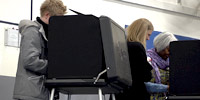In This Episode << SLIDE LEFT TO SEE ADDITIONAL SEGMENTS
Leah Daughtry
Read more of Kim Lawton’s interview with Leah Daughtry, chief executive of the 2008 Democratic Convention:
Q: Tell us a little bit about the many ways religion and faith-based ideas and people will be incorporated into the convention this year.
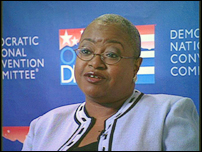
Leah Daughtry |
A: Well, we’re very excited about what we’re planning for the convention this year. It’s really an outgrowth of all the work that we’ve been doing over the last several years to ensure that people of faith, Democrats who are people of faith, have a voice that is respected inside of the party, that’s heard inside of the party. So you’ll see a lot of that coming to fruition at this year’s convention. We’ve got two specific things that we’re planning. One, there will be an interfaith gathering on Sunday (August 24) before the convention. It’s actually the first official event of the convention weekend. It’s Sunday at 2:00, and we’ll be bringing people of faith together, people of values together, to come in one place in fellowship with one another to celebrate our accomplishments this year — to be with one another as we look forward into the future, to ask the blessings of the Creator as we embark upon the important work that we’ll do during convention week. And then the other thing that we’re going to do, another first for the convention, is a people of faith caucus. If you’ve been to a convention before you know that during the course of convention week there are any number of caucus meetings for our various communities. Whether you’re Asian-Pacific Islander or African-American or Latino or women or youth or seniors or veterans, there’s a caucus meeting for you. So what we decided this time is to have a people of faith caucus. There are millions of Democrats who are people of faith, and we wanted to honor that commitment that they have to their faith and to the party by having a designated, set time that they would come together as a group, in much the same way as the other caucus meetings. So they’ll meet just like every other caucus twice during the convention week for a couple of hours to talk about the issues that are of concern to most people of faith.
Q: What message do you hope all of this sends to voters?
A: I think it’s important, you know, we’re the big-tent party, which means we have — we pride ourselves on having great diversity of thought, great diversity of opinion inside of our party, all of which is respected and honored, and so this is just another way for us to respect and honor the traditions, the values that some of our voters have. All of us have values. We all come to our lives with a certain set of values. For many of us, those values spring from a place of faith. So what we want people to walk away with is understanding that this is just another part of the Democratic Party, that we’ve got millions of people who are people of faith, and we want them to feel at home here, although some of us, like me, have always been part of the party. And so to actually have a place where I know that I can go, and other people who are like minded, to discuss political issues, to discuss societal issues with people whose values spring from the place as mine, is very important. And that’s what we want people to walk away with. To really — the sense that there is a place for you inside of the Democratic Party whatever your belief system is, whatever your geographic background, your ethnic background. You can find a home in the Democratic Party, because although we are diverse, we really come together around core issues, and we understand that those issues that really bring us together and unite us are much stronger than those things that may divide us.
Q: Some people felt, especially four years ago, that the Democratic Party wasn’t open to religion, and polls showed that when people were asked which party is more open to faith, the Republican Party was seen as being more open. Why was that, and is this a change for the Democrats now?
A: You know, I don’t know. I mean, you’re speaking to someone who’s always been a Democrat, who’s always been a person of faith. I’m a fifth-generation pastor, so I’ve always had a place for faith in my life. It’s always been very important to me, and I’ve always voted Democrat, and so it was a puzzling phenomenon to me to see the party that I’ve always been a member of labeled as a party that doesn’t have people of faith or isn’t open to people of faith. So I think for me it was really more about us as a party saying, no, wait a minute. We are people of faith. There are millions of us, and we’re Democrats, and we become Democrats because of the values of our faith, because we believe that our Creator leads us in this direction, that we see the values of our faith mirrored in the values of the Democratic Party. So I think for some of us it’s just a matter of being more vocal, being more open about it, talking about it more, and not assuming that everybody in the larger society understood why I’m a Democrat. I’m not a Democrat because I’m from Brooklyn, New York, although that’s pretty much what we have in Brooklyn. But I’m a Democrat because the values of my faith, my biblical teachings, the foundations under which I guide my life are best exemplified in society in the Democratic Party. So I think, for us, we became more vocal. We decided to stand up. We decided to stand up for what we believe and to say this is who I am. I’m inside the party. I’m a person of faith, and I’m glad to be here, and I’m proud of it, and really to take back the conversation and to take back what had become this flag that we were painted under, to say this doesn’t represent me. I don’t know who you’re talking about, but you’re not talking about me as a person of faith. I’m a Democrat, and I’m glad to be here. So I think it also meant that we had to be more proactive inside communities of faith, to find the others like us and to encourage them to also speak up, and then to do some outreach into communities of faith that may not have been Democratically leaning and to encourage them and to help them see themselves inside the party — to find the values that we share in common and to help them to come over to the blue side of the ledger, and I think we’ve been very successful at that. Really just changing the dialogue and changing the conversation to a values-based message and helping the American voter really understand not the specific legislation, not the specific program that we’re advocating, but really what are the values underlying that? Why do we believe in children’s health insurance? Why do we believe that our social security system should be solvent? Why do we believe that health care is important? It’s not the health care itself, but it’s the value that drives us to that and to fight for those things for all Americans, and that’s what we’ve been doing a very good job of talking about over the last several years.
Q: So taking back territory? Did the religious right cause the Republicans to have the corner on some of this?
A: I think the religious right became very vocal and became very active inside the Republican Party and, you know, really made a name for themselves and suddenly became a force that the party infrastructure had to deal with, because they became so vocal and so strident and so forceful about their belief system, and I don’t fault them for that. I think they see that party, or they see the political system as a way for them to bring goods and services and help people live abundant lives on earth, and they went that way. I think for us in the Democratic Party, we had to do the same thing [and] say wait, you know, we’ve got to stand up and talk about what we believe, and all of us who are people of faith are not in the Republican Party. There are great millions of us who are on the other side, and we’ve just got to do a better job of talking about that.
Q: You mentioned it’s not just the policies of health care but the values that underlie it. What are some of those values that you think especially resonate with people of faith? What are those bigger, deeper issues that are at stake in some of these specific policies?
A: Well, you know, I believe — I’m a Christian, I’m a pastor, and for me it’s about the teaching of what I find in the biblical text, and everyone has their own holy text upon which they rely. But for me it’s about how we care for one another, that the God that I believe in is not singularly concerned only about the individual, but also there is an abiding concern about the community that we live in and that we are not islands unto ourselves, but that we live in relationship with each other and that our relationship with each other is as important as our relationship with the Creator himself, and so God invests a lot of time in the holy texts in issues of community, in issues of how we love each other and serve each other and respond to each other and care for each other, and when you have that sort of foundational understanding of your faith, then it leads you to be concerned not just for my own economic welfare, but how’s my community doing? It’s not okay that some people are homeless and some people live in 15-bedroom mansions. There’s something wrong with that, and I have to believe that God is concerned about that. It’s not okay for me to have great health benefits, and some people can’t afford them. It’s not okay. I think God is concerned when families aren’t able to take care of their children. The Bible says children are inheritance from the Lord. So if they come from God, and they’re God’s gift to you, then you should have the resources that you need to take care of your children, to provide them with safe and healthy living environments so that they can grow up to be abundant, God-fearing citizens themselves. So when you have that kind of foundational understanding of the texts, a foundational understanding of your faith, then it leads you to advocate for legislation programs that will allow your fellow sister and brother, not just your fellow man and woman, but your sister and your brother to live full and abundant lives here on earth. That’s why I’m a Democrat, because I believe the values of our party help us to live in community with one another, and not just next door to some guy I don’t know, but who’s my neighbor. How are they living? It’s not just about me; it’s about those who I’m in relationship with.
Q: A key base within the Democratic Party and a growing base are people who call themselves secular and unaffiliated voters. Is there a backlash from some of them? Is there discomfort from some of them as the party structures do more to accommodate faith? Do you hear people saying they’re worried that you’re going to start sounding like the Republicans?
A: No, you know, I think the wonderful thing about the Democratic Party is that you have so many different kinds of people inside of the party, and we do a really good job, and we work very hard at respecting all of the diversities of opinion. And so if your values come from your grandmother’s porch that you spent your summers on, that’s fine and that’s great and that’s what leads you to care for other people and leads you to get up every day and work hard and pay your taxes and do the right thing, that is important and as valuable as the person whose values come from a holy text. And I think inside our party both things are honored, and both things are respected, and as long as, I think, we are respecting everyone, I think that’s really at base what everybody wants, as a human being, is to be respected and to be loved for their opinions, whatever they may be, even if you don’t agree, and I think in the Democratic Party you find that, that people are able to be respected for whatever their belief systems are, so we really haven’t had, you know, blowback from people who are afraid we are going to make this the church of the Democratic Party. But it’s a recognition that there are people whose values come from a place of faith, and they are as welcome and have always been as welcome as people whose values come from grandma, or whose values come from their teachers, or whose values come from their parents. It’s all a value system. We’re not basing our values as Democrats on a holy text. We’re basing it on a value system of how we love and treat and care for each other in community.
Q: On the other hand, are you hearing from people who say thank God you’re finally doing this, we’ve been waiting for this?
A: Yes, we do. We hear it all the time and, you know, and that’s very gratifying. I was in South Carolina for a Democratic debate last year and I went a couple days early and was just walking around town meeting people. Every store I go in people would say, “Thank God, you’re another Democrat. I’m the only one.” And you go to the next store, and somebody else would say the same: “I’m the only one.” I said, “No, you’re not the only one, ’cause the woman in the store next door to you, she’s a Democrat, too. You should meet each other.” And I think at the base of this you find people of faith saying, “I thought I was the only one” or “I knew where me and my church members or me and the members of my synagogue were Democrats, but I didn’t know there were all these other people.” So in the outreach work we’re doing, you’re finding a lot of people saying, “Thank goodness. I knew there were some of us, but now I know there are many of us, and it’s good to know and to be in community and fellowship with people who are like-minded.
Q: How do you balance being in politics and being a pastor?
A: You know, for me it is two sides of the same coin, really. Being a pastor is really about shepherding people, about being entrusted with the care of another human being and God giving you this person to care for and to love, and my job as a pastor is to shepherd them, to nurture them, to recognize gifts and talents, and help them, to mold those and shape those to become everything that God intended them to be. And my role inside the party is much the same, is, you know, coming into organizations, seeing what’s there, recognizing talent, recognizing ability, recognizing skill. In church we call it gifts and talents. In business we call it skills and ability. It’s the same sort of thing, and helping people, then, to maximize what they have so that they can help to make the change that America needs, or help to make America be all that they would like it to be. So it’s sort of the same sort of thing on both sides. So when you think about it that way, it’s not that much of a balance. It’s carrying out what I think my mission is.
Q: Is there ever a time you feel a conflict between the two roles?
A: No, it’s not very often. Not very often. For me, the challenge is more balancing the time than balancing the issues. I think, because of my value system, you know, I’m called to love and to respect and to honor other people. I believe in a God that loves and respects and honors and expects us to be accurate reflections of him, and as long as I go into any situation understanding that, then it’s very easy for me to try to find common ground with anyone, so that the challenge always, for me, is how to balance the time and get out of the office in time to teach Bible study and make sure I have time for sermon preparation. I don’t work on Sundays. It’s the Sabbath. But I try to use that time for my church family. So that’s the big thing for me is just juggling the time. But other than that it’s not been that big a challenge.
Q: This campaign season especially we’ve seen a lot of controversy surrounding religion. Both candidates have had issues with pastors, and that’s been a point of controversy. Why do you think things have been so much more heightened this time around than they were in the past?
A: I think, you know, we got down to the home stretch and you had two candidates who are very deeply involved and driven by their own faith, and people know that, and so, when you have — you know, we’re living in a time where everybody wants to know everything about everyone. You know, look at the newsstands. You’ve got more, you know, exposes, and people looking for information. They just — people want to know everything about you. Everything. It’s the information age that we live in. And when you have two candidates who have such deeply held beliefs, I think people want to know where they come from. Where do those beliefs come from? What drove them? What fed them? What led them in the way to this path that you would spent two years running for president? Everybody’s not going to do that. It’s a very rare and special person that invests that kind of time and love in their country. And when you have two candidates who are faithful and claim that as part of their value system, then I think people want to know more about that as part of understanding who they are and what makes them tick.
Q: Some people say the controversy shows that religion shouldn’t be involved in politics, that politics gets ugly and so therefore it’s damaging if religion delves into politics. What do you say to those people? You’re a pastor, and you’re into politics.
A: Politics is practiced by people, and people bring their whole selves to the process, and you can’t say to a person of faith “leave your faith at the door” anymore than you can say to a mother or a doctor, “Don’t think about your kids when you’re at work” or “Separate the motherhood side of your personality from the rest of what you have to do.” It’s part of you. It’s part of what drives you. It’s part of what informs you. It’s part of what makes you do the things that you do. I think it’s very naive for people to say, “Check the religion at the door.” If you’re a person of faith, you know, that’s not possible. It’s part of what feeds you and guides you and directs you and informs you, and nine times out of ten I’d say it’s why you’re in public service in the first place, because of your deeply held values and beliefs. So I don’t know that that’s really possible, to say check it at the door. Now, you know, whether we should be having conversations about sermons on Sundays and who, you know, who gets Communion and whether those sorts of things, the rites and the rituals of the church, should be driven by political considerations, I don’t know that that’s appropriate. We are fortunate to live in a country where we have this freedom of religion, or freedom of no religion. You’re free to do what you want to do, and I think all of us want to preserve that. None of us want to become a country where we’re forced to worship any one particular way or not worship any one particular way, and to the extent that religion remains separate in that regard, I think that’s a very a good thing, and it’s part of the essence of who we are as Americans.
Q: Do you think we’re at a point in our country where we’re renegotiating, though, where some of those boundaries might be, where some of the lines are?
A: I think we’re in a time now where people are more comfortable talking about their faith — some people, not everyone. There are many traditions where you don’t talk about your faith, and I think that’s okay, too, and people shouldn’t be forced to talk about their faith if that’s not what they’re comfortable with. But I think as people are comfortable with it, and they inject that into the public sphere, into the public discourse, then I think Americans, particularly if they’re voting for you, have a right to know more about that and, you know, should feel free to ask those kind of questions. If that is part of who you are and part of what you’re saying is driving you to do the kind of work that you’re doing, then, by all means, you should be open to it. You have to be open to it, I think, in this particular time, in this information age, to talk about what that means for you and why that’s important.
Q: Barack Obama has been comfortable talking about his faith so openly, despite some controversies. As the presumptive nominee, what does that symbolize for the party and for faith?
A: You know, I think for all of us in the party, we are so very excited about him as a nominee, one, because of the message of change that he’s bringing to the country, for the millions of new people that have become excited and invigorated and enthusiastic about being part of the process, the number of first-time participants that he’s inspired. I think it’s just really overwhelming, for someone who’s been in this business now 25 years or so, it just absolutely amazing to me the kind of energy that his candidacy has infused into this race. As a person of faith it is inspiring as well, because he’s also a person of faith, and it says to me — for the seventeen odd million votes that he’s gotten, that for some people that was an important bench mark, and some people said, “You know, I understand him better, or I understand his values better, because of the way that he’s engaged with his faith, and the honesty with which he’s engaged in his faith.” In his own biography, he talks about — unlike me, I’ve been in church my entire life — he’s someone who had to come to the faith, and who wrestled with it the way that many people do, wrestle with values and wrestle with the notion of God, and who God is, and what they believe, and that’s a personal struggle that he had that he’s freely, openly shared, and I think it mirrors the experience of so many Americans, but really so many people around the world who have that same kind of struggle and come to a place in, you know, the midpoint of their lives where they decide what they believe, and they have to still wrestle with it. There are no absolutes with God, and to have someone who’s honest about that and says, “You know, I’m struggling with this. I struggle with it still. But I believe something in the core of my being resonates with this notion of God, even though I don’t have all the answers, I believe this deeply in the core of my soul.” And that so many Americans could see that and say, “I believe in Barack Obama. I believe in the change that he’s going to bring. I’m going to sign up. I’m going to go on the Internet. I’m going to send my five dollars. I’m going to run for a delegate. I’m going to get involved. I’m going to go vote for the first time.” It’s absolutely a wonderful and, of course, historic experience for our country, and so I think he’s done wonders in several ways — some very obvious, but also some very subtle, for the advancement of the conversation in our faith, in the public sphere.
Q: Tell me about some of the Democratic projects beyond the convention.
A: We began Faith in Action in 2005 when Governor Dean became chair [of the Democratic National Committee]. It was something that was personally important to me to create Faith in Action or a faith outreach program for the party, and Governor Dean was a willing, enthusiastic participant, and so what we’ve done over the past three years is really concretize and formalize our outreach to faith communities to a variety of different communities, to those who are cornerstones of the Democratic Party, so whether they are Jewish, Muslim, Christian, Protestant, Catholic, to really be very authentic in our outreach to them, so what that has meant really is a three-pronged approach, one around national visibility and engaging faith leaders who are nationally known, theologians, clergy people, men and women, to help us be authentic in our faith outreach. So we’ve got a wonderful faith advisory council of 60 or so people with well-known names who come together three or four times a year, and we talk to every month, kind of help us work through authentic faith outreach. Also to help, the second part is to help our state parties all across the country to develop their own faith outreach programs, because we recognize that faith outreach in Alabama looks a whole lot different than faith outreach in Pennsylvania, and so we want to help them develop a program that is authentic for that community and responsive to that community. And the third thing is really around training and mobilization around our message and our values. How do we talk about the programs, the legislation that we are proposing, the change that we are proposing for America in a way that resonates with people’s values, that’s more values driven than laundry list driven? And so that’s what we’ve been focused on for the last three years. We’ve done a number of outreach programs, we’ve trained people all across the country in all 50 states how to do faith outreach, how to be sensitive to the various demands and requirements of the various faith communities, so if you’re in a Jewish community you’re not knocking on doors on Saturday — how to be sensitive to those sorts of things. We’ve trained people all across the country. We’ve trained elected officials and some others on how to talk about their faith to the extent that they want to and how to really talk to voters about values-driven legislation, about the things that drive them into public service. So we’ve been very fortunate, and it’s been a very gratifying experience for us over the last three years, and it all really culminates now at the convention and the activities that we’ll have going on there.

